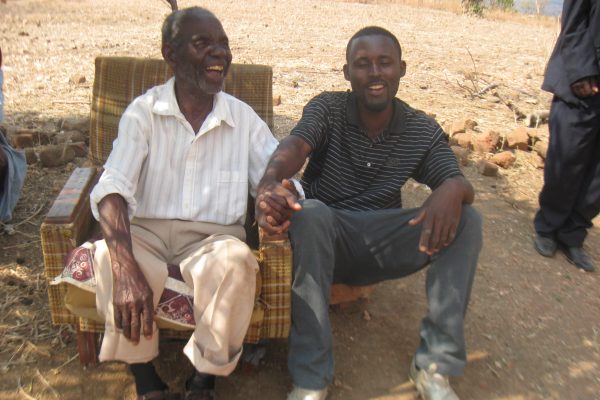
HURUNGWE — The late Biggie Tembo was named “Mhosva” Marasha because he was born before his father had paid lobola for his late mother Anna Matunga-Marasha, who hailed from Zvimba, the late musician’s father Tembo Marasha has revealed. Biggie Tembo’s first name was “Mhosva” before he was named “Biggie” at a later stage.
The musician later renamed himself Rodwell.
“I named him ‘Mhosva’ as a confession that I had impregnated his mother before marrying her. He was born in 1957 in Chinhoyi’s Hunyani Section and all his four brothers and a sister were raised in the same town,” Marasha told The Standard Style in an exclusive interview at the burial of his wife in Hurungwe recently.
“Though Biggie was bright in school, he was naughty. He could make his own banjo guitars. His first guitar was made from his mother’s old pot and we were furious about him tampering with my fishing rods then. He continued singing at home and at family gatherings.’’
Marasha (85) said the late musician was good in school to the extent of enrolling at Mzingwane High School in Matabeleland South in the early 1970s. However, the deal fell through due to the liberation war going on at the time.
According to Biggie Tembo’s surviving brother, Moyo Marasha, the family was inspired by their late mother, who was a storyteller and a musician. He said their mother took part in traditional functions after the family had moved to Hurungwe in the late 1980s. He said their mother was nicknamed “Chitaunhike” owing to her eloquence and singing.
“Most of Biggie’s songs were drawn from folktales told by our mother, for instance the song Simbimbino, which became an international hit after he fused jiti and jazz. It was a folktale, but he sang it well,” said Moyo.
“Even the song Chitaunhike was a folktale that encouraged elders to brew beer and look after younger generations as they ventured into the ‘unknown world’.’’
- Chamisa under fire over US$120K donation
- Mavhunga puts DeMbare into Chibuku quarterfinals
- Pension funds bet on Cabora Bassa oilfields
- Councils defy govt fire tender directive
Keep Reading
The song Chitaunhike has a deep Kore Kore accent as Tembo tried to identify himself with his roots in Hurungwe.
Moyo said Matunga-Marasha was a household name in Hurungwe as their late mother was often invited to rain-making ceremonies and other traditional gatherings.
“She was an eloquent singer and mbira player. She used to be invited as a special guest during traditional functions. She imparted her musical skills to all of us, but Biggie was her masterpiece as he could fuse the traditional songs easily with the guitar,” Moyo said.
Moyo said Biggie Tembo never went to the liberation war but the name Bhundu Boys was made up in support of the struggle. “Biggie never went to war, but he understood why the war was being fought,” he said.
Moyo, who is also a musician, said he is the one who wrote the song Hatisi Tose, which made the Bhundu Boys a household name. He said the song was inspired by a real-life situation after his late brother Francis broke up with his fiancé.
“It was a true story and I wrote the song and Biggie sang it. Some related the song to Biggie’s domestic problems with his wife Ratidzo, but that was not the case,” he said.
Meanwhile, the late musician’s son, Biggie Tembo Junior, seems to have followed in his father’s footsteps and said he used to accompany his late grandmother to traditional gatherings.
“I have taken music as part of my life and would like to revive my father’s career. I am facing challenges to acquire instruments and I don’t have transport of my own, but with the support I am getting, it will soon be a thing of the past,” said Biggie Tembo Junior.
“My mother is standing by me, but I am part of the Tembo family and that is why I am here today.”
Biggie Tembo Junior, aged 25 years old, has since been joined by his brother Elia and they are collaborating well in their bid to revive their father’s legacy.
The late Biggie Tembo, who made international headlines as part of the Bhundu Boys, committed suicide after suffering depression. According to relatives, Biggie Tembo died a destitute after he failed to manage his life.
However, people had a chance to get a glimpse of the Tembo family, leaving a tall order on Biggie Tembo Junior to revive the Chitaunhike legacy in music circles within Hurungwe that captured the outside world’s imagination.











